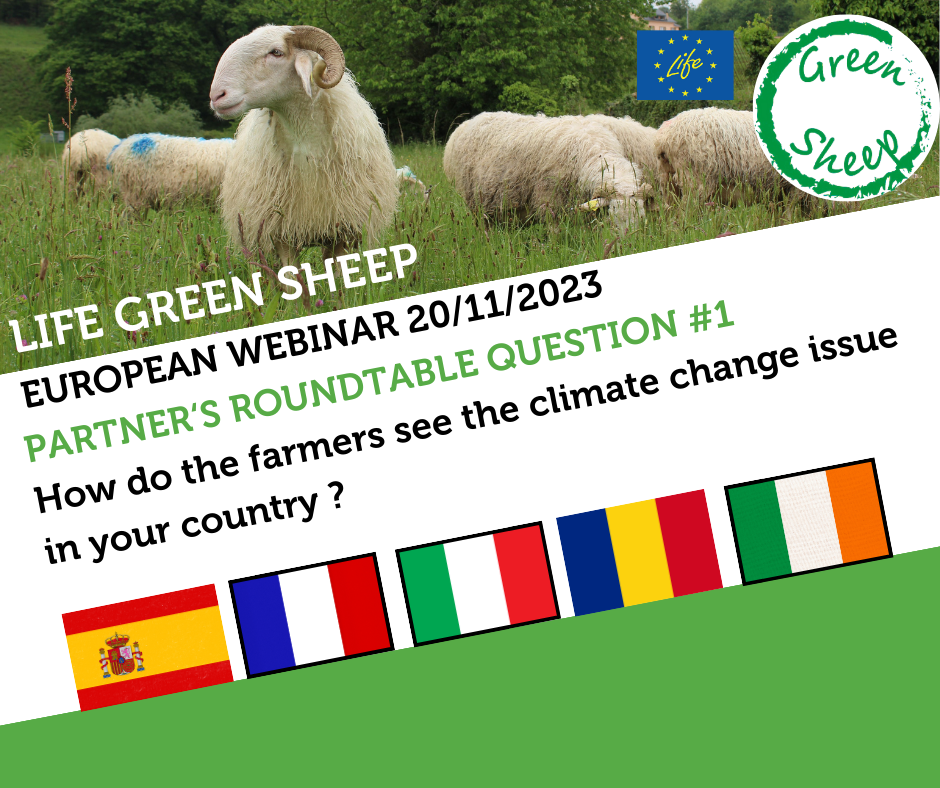![]() Catalin Dragomir (Romania) :
Catalin Dragomir (Romania) :
The farmers have a very low awareness on the topic of mitigation the of climate change, which requires preparatory (e.g. awareness raising) actions, especially since the subject is new to the country, comparing with Western Europe. Also, they are focused on current, pressing problems as they need to adapt to a more competitive environment. The mis-information and dis-information imply that policies aiming to mitigate are a threat for the farmers, although Romania has a good animals: surface ratio and good potential for significant gains in efficiency. The general public is more aware, due to general media and because of the climate-change effects, especially longer and more profound draught episodes in some parts of the country.
![]() Gabriella Serra (Italia)
Gabriella Serra (Italia)
If we compare the awareness achieved today by Sardinian farmers compared to ten years ago, when the topic of climate change associated with agriculture began to gain ground, we can consider ourselves quite satisfied. We started from a totally new and unfamiliar topic, which has often been misunderstood, and we moved on to a discussion that is now part of the sector, although the initiative to intervene in it never came from the farmers, but support and encouragement from external technicians is always needed. However, now that we are starting to understand the links between extraordinary climatic events and climate change, the topic undoubtedly has a greater connection with reality. It should be also underlined that, whenever the economic aspect linked to the environmental impact of farms is correlated, farmers’ attention is certainly more attracted, and a greater collaboration could be obtained.
![]() Roberto Ruiz (Spain)
Roberto Ruiz (Spain)
Farmers are becoming more conscious on the impact of climate change upon the availability of resources. Drought since the end of 2022, although in the south of Spain it started in spring 2016 : it affects strongly to the crop yields and the production of grazing resources. For example, despite the extra effort that has been successfully made to de-seasonalise the flocks in Aragón, the production of lambs at the star of this autumn 2023 compared to 2022 has resulted in 29. 11% fewer lambings and 26.62% fewer lambs born. Stronger and longer hot waves become more frequent, which has an impact on milk yield, but also on reproductive success. Also emerging diseases; the last sheepbox virus outbreak or the epizootic Hemorrhagic Disease (EHD) (since september 2022) are clear examples: some of the top flocks (genetics and milk yield) in Castille-La Mancha had to be slaughtered. This involves restrictions for movement of animals and also for grazing. However, they feel unfairly blamed for the emissions, since they are more convinced on the positive environmental impacts of sheep farming systems.
![]() Cathal Buckley (Ireland)
Cathal Buckley (Ireland)
Greenhouse gas emissions is very much on the radar of farmers in Ireland over the last 5-10 years. Ireland is unusual in an EU context in that over 38% of greenhouse gas emissions are generated from the agricultural sector. The Irish Government have introduced an Act of Parliament dictating that the Agricultural Sector reduce GHG emission by 2030 from a 2018 base. Hence, all sectors across agricultural production will need to assist in meeting this target. There is growing evidence that the farming community in Ireland feel unfairly targeted as polluters and that their role as food producers and landscape managers is not understood. They point to low carbon footprint production vs other countries that import into the EU and carbon leakage arguments. Indeed at one stage there was talks about the establishment of a farmers party much like what happened in the Netherlands. *
![]() Sindy Throude (France)
Sindy Throude (France)
Today, sheep farmers are working to manage the impact of CC on a day-to-day basis, but less on reducing their greenhouse gas emissions. Indeed, they may feel less concerned because sheep farming makes such a small contribution to greenhouse gas emissions and is considered “green”. The work carried out by the Green Sheep project is therefore helping to step up communication on this issue and raise awareness among farmers of the need to improve their practices to reduce greenhouse gas emissions and improve their environmental performances.
Furthermore, even if CC is a major issue, recognised by all, reducing GHG emissions and improving environmental performance are not generally the primary objectives/issues for a farmer in managing his farm: the economic issue remains the priority.

